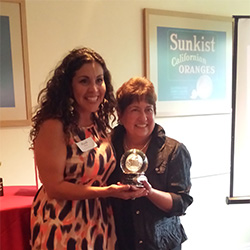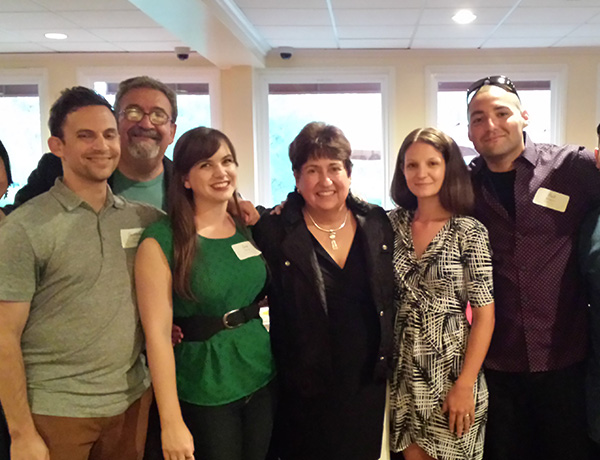

Dianne Philibosian with staff from the Institute for Community Health and Wellbeing at her retirement celebration in August 2015. Philibosian retired as director of the institute. Photo provided by the Institute for Community Health and Wellbeing.
When Dianne Philibosian arrived at California State University, Northridge in 1973, early childhood education was being taught in disparate pockets on campus.
The doctoral student with a specialization in early childhood education was hired as one of the founding faculty in CSUN’s Department of Elementary Education’s early education program. She eventually served as coordinator of an interdisciplinary major in child development — putting CSUN on the map as a place to learn about the education of children.
Today, Philibosian is a nationally known expert on the care and education of children.
She recently retired from CSUN after 42 years of service in various capacities, including as director of the Institute for Community Health and Wellbeing and associate dean of the College of Health and Human Development. She has served as faculty in four different departments and two different colleges.
“I’ve had such a magnificent career,” said Philibosian about her four decades at CSUN. She recalled a multitude of firsts, including serving as head of CSUN’s new pre-kindergarten through third-grade credential program and director of an innovative off-campus early childhood development master’s degree program.
“We were pioneers,” she said. “It was so exciting to be here, laying the foundation.”
Philibosian said she found CSUN through a combination of convenience and timing.
Although she was born in San Diego, Philibosian spent most of her childhood in the Fresno area. After graduating from the University of the Pacific, she taught elementary school in Stockton for several years before entering graduate school.
She earned her master’s degree and her doctorate at Southern Illinois University, spending several years helping establish and train the workforce for the first Head Start preschool programs in Illinois. She was tired of the snow and decided to relocate to Southern California to be closer to her brother, his wife and children, who lived in Tarzana.
“This was a natural place to gravitate to,” Philibosian recalled.
At CSUN, she adopted a teaching approach similar to what she had experienced as an undergraduate and graduate student — close relationships with faculty.
When asked about the best part of her experiences at CSUN, she responded: “The students throughout the years — so many have touched me deeply. We really have unique students who are overcoming seemingly insurmountable odds to stay in school, graduate and launch successful careers.”
“I saw them not as a sea of students, but a sea of individuals,” Philibosian said. “I found ways to personalize my assignments.”

Philibosian accepts an award from Michelle Miranda of Canoga Park-based RUTH YouthBuild, one of the many community groups she assisted.
She also has almost seamlessly straddled the fence between academia and community, serving on numerous state and local boards and task forces, including the state of California’s Child Development Policy Advisory Committee, County of Los Angeles Child Care Planning Committee and working with the Warner Center Association in developing a model early childcare program.
She said her work with the Institute for Community Health and Wellbeing is a great place to end her formal career at CSUN. The institute, which is a collaboration of campus and community members, is committed to enhancing the health and well-being of individuals, families, organizations and communities within CSUN’s service region. The primary mission of the institute is to foster healthy living through community and campus partnerships.
“Our relationships with people and the communities we serve are so important,” Philibosian said. “As we go into the community, we say we are part of the community and let’s plan how we can leverage our faculty, grants and resources so we benefit the community together.”
Philibosian, a Pasadena resident, also has won numerous awards, including CSUN’s Extraordinary Service Award, the Medallion of Excellence Award from the University of the Pacific and the Northridge Chamber of Commerce Outstanding Community Contributions in Child Care Development Award.
She said she plans to remain connected to CSUN. She is currently working as a special-projects consultant with the Institute for Community Health and Wellbeing, the College of Humanities and the Office of Research and Graduate Studies in their efforts to affiliate with the American University of Armenia (AUA).
In October, CSUN President Dianne F. Harrison and the president of AUA signed a memorandum of understanding to foster scholarly and educational collaborations. Philibosian spent two weeks in November at AUA meeting with faculty, staff and students who want to collaborate with CSUN.
“We have many irons in the fire,” said Philibosian about the potential for collaboration and exchange. “It’s all very exciting.”
Philibosian is participating in the campus’ Faculty Early Retirement Program, which allows faculty to transition into retirement by working a reduced schedule over a five-year time period. She said once the project with AUA is completed, she’ll see what’s next.
“It has been a great career,” she said. “I’m grateful to the students and my colleagues, who have made it such a gratifying experience.”